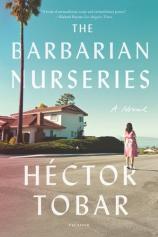Reading Group Guide
Discussion Questions
The Barbarian Nurseries

1. What were your initial impressions of the Torres-Thompson family and Araceli? How did your understanding of them change throughout the novel?
2. Maureen and Scott, along with their friends, consider themselves to be progressive. How would they need to change if they were to bring about true progress in their community? Are the newly rich of this century very different from wealthy entrepreneurs from other generations?
3. Do Araceli and the other servants in the neighborhood have any leverage, or are they entirely powerless with their employers?
4. Discuss Los Angeles as if it were a character in the novel. What personalities and history are captured in the neighborhoods Araceli travels to, with and without Brandon and Keenan? How do the extremes of rich and poor affect the city as a whole? Do Brandon and Keenan see the world the same way as other characters in the novel, even though neither one of them has traveled far before (except through fiction)?
5. In Maureen's and Scott's minds, what does good parenting look like? How is this different from Araceli's parenting standards? How does Brandon and Keenan's childhood compare to their parents' childhood?
6. Does Maureen treat her baby daughter, Samantha, differently from her sons? What does it mean for her to have a little girl in a household of males? When Maureen and Scott have power struggles, does gender come into play?
7. In the scenes depicting Araceli's time off, what is most striking to you about her true self and her lost dreams of being an artist with a college education?
8. What would America look like --- economically, socially, and otherwise --- if Janet Bryson had her way? Were you surprised when the author revealed how much Araceli earns per week ($250 cash, on top of room and board), as well as Pepe's annual salary range (in the four figures)?
9. At every turn, Tobar finds a place for humor while keeping the story line tremendously realistic. What makes satire the best way to understand the issues of class and immigration raised in the novel? How did it affect your reading to know that the author is a Los Angeles native whose parents emigrated from Guatemala?
10. Discuss the translation and language issues that arise in The Barbarian Nurseries, including the moments when non-native speakers try to use Spanish. Is Araceli in some ways protected by the fact that her English is limited?
11. Ultimately, whose fault is it that the Torres-Thompson children were briefly without parents? Could something similar have happened in your household? If so, would you have been grateful to Araceli or suspicious of her?
12. Why is Scott so different from his father? How has Grandfather Torres evolved since the time the photograph was taken?
13. The title is referenced in chapter eight, when Maureen looks at the landscapers and thinks to herself, “What am I doing, allowing these sweaty barbarians into my home?” In chapter ten, Araceli uses the expression qué barbaridad when she thinks about Maureen's not telling her where she's gone. Who are the barbarians in this novel? What is being nurtured in the “nurseries”?
14. In the closing scenes, many of the characters experience newfound freedom. What did they have to sacrifice in order to gain that freedom? How did their definition of freedom change?
15. How would you have answered Felipe's question in the novel's final lines?
The Barbarian Nurseries
- Publication Date: September 4, 2012
- Paperback: 432 pages
- Publisher: Picador
- ISBN-10: 1250013798
- ISBN-13: 9781250013798








